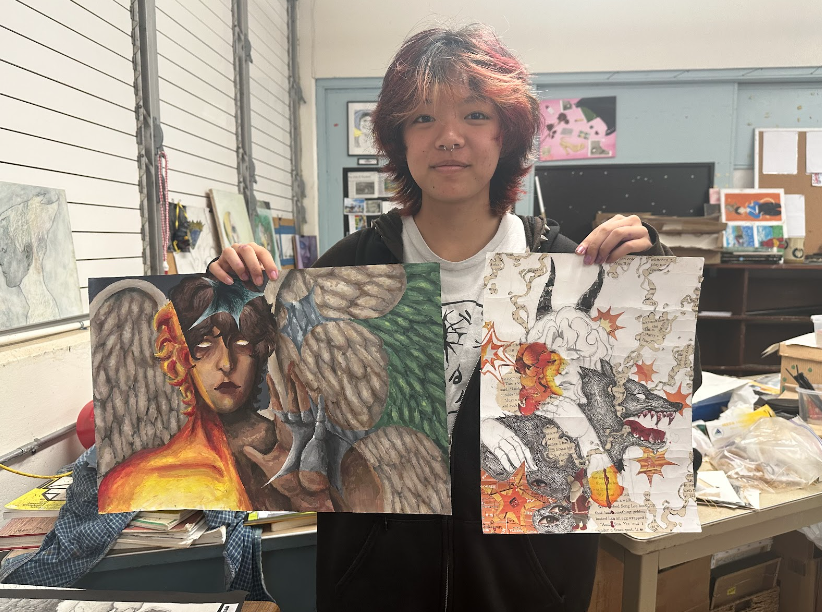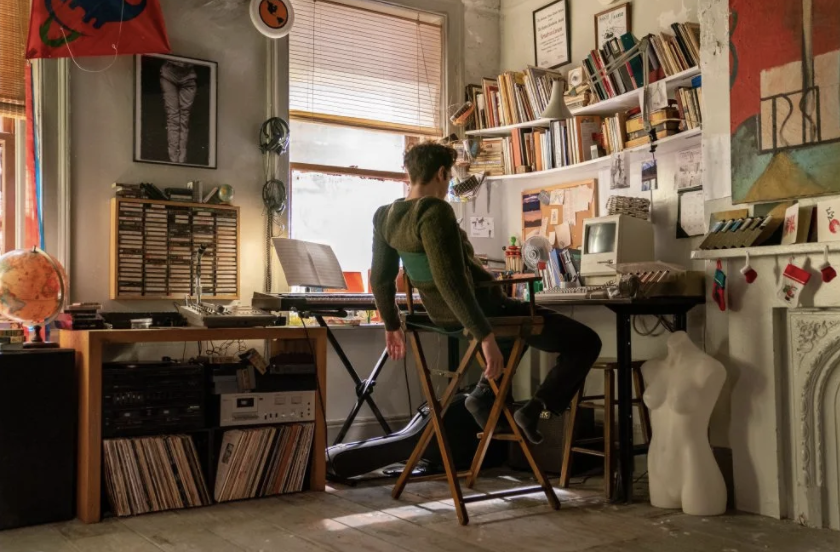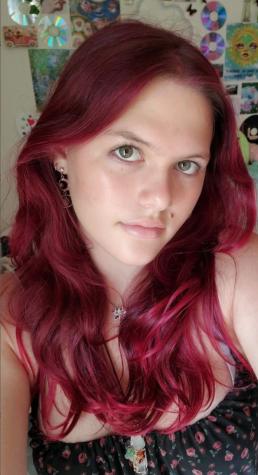A rapid-spreading forest fire devastated Lahaina, Maui on August 8th, 2023, killing at least 98 people and becoming the 5th most deadly wildfire in U.S history. In the aftermath of these fires, individuals and organizations across the state have come together to support Maui in any way they can.
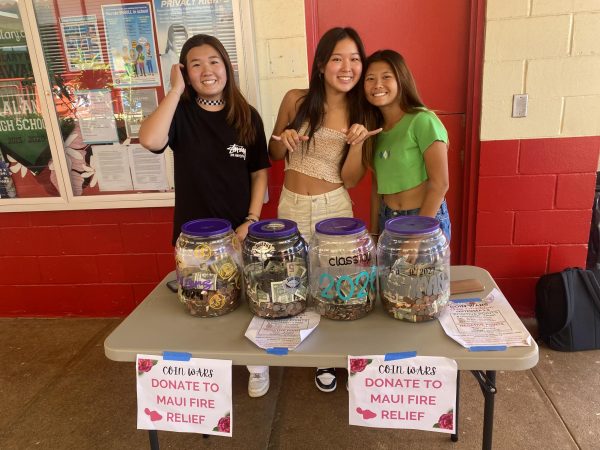
“You get all these people wanting to volunteer whether it’s physically, whether it’s their time, whether they make donations, people in our community always seem to step up for one another,” Hawaii Foodbank director of marketing and communications Danny Schlag explained.
Every week since the outbreak of the fires, the Hawaii Foodbank has sent anywhere from two to six team members from Oahu and Kauai over to Maui to support Maui Foodbank. According to Schlag, Maui Foodbank is staffed by only 19 people, so the immediate need for support from Hawaii Foodbank was heightened in the aftermath of the fires.
“I think their team at first was a bit overwhelmed, but they’re incredible,” Schlag praised. “They rose right to the occasion, and especially out there there was more of an urgent, ‘all hands on deck, everyone jump in, let’s make sure we get this food out to the people who need it’ type of thing.”
This sense of urgency was not confined to Maui, however. In the days and weeks following the fires, the entire state of Hawaii rushed to Maui’s aid, providing support in all areas needed.
The Hana Hou festival, held on Sept. 8 and 9, gave people the opportunity to heal through music, and donated all profits to Hawai’i Community Foundation’s Maui Strong Fund. During the Paddle Out for Lahaina, the public came together and paddled out to Queens Surf in honor of families and friends impacted by the wildfires.
Oahu-based shave-ice shop Uncle Clay’s House of Pure Aloha (HOPA) partnered with the Ma’i Movement to help provide those affected by the fires with menstrual products.
HOPA manager Aria Almario also donated profits from her own apparel business, Sea Seven, towards Maui relief efforts. While she doesn’t have any direct connections to Maui, Almario has a strong love for Hawaii and the community that exists here.
“Growing up, I learned the Hawaiian language, I danced hula, I was very strongly involved in the community and the culture and so I think, even though by ancestry, by heritage I’m not Hawaiian, I have a very strong respect and appreciation for the Hawaiian culture and the Hawaiian people,” Almario said.
Almario was born and raised in Hawaii and is a 2nd generation American citizen. She has family in Tokyo and explained that the more she travels to places outside Hawaii, the more she falls in love with being home. She especially connects with Hawaii’s value-system and strong emphasis on family loyalty.
“Not just blood family loyalty, but the family that you create through friendships and experience,” She explained. “I think the Maui Fires was a good example of how, if worse comes to worst or in the need of an emergency, the community’s going to show up no matter what. I feel like there’s essence of that in every community, but I definitely think that it’s extremely strong here.”
This community support was seen especially at the Hawaii Foodbank, which received a massive influx of food donations during the aftermath of the Maui fires.
Due to their larger staff size and number of connections on the mainland, Hawaii Foodbank has been able to support Maui Foodbank by coordinating all inbound food donations from both Oahu and the continental United States.
“We’ve secured a secondary warehouse space here on Oahu just for Maui donations, and then what we’ve been doing is working directly with the team over there,” Schlag explained. “They let us know what items they need, when they need it, and then we organize those shipments to go over on a regular basis.”
So far Schlag estimates that about a dozen or two containers have been sent out to Maui and over 40 more are scheduled to go out.
In addition to managing inbound food donations, the Hawaii foodbank also established a Maui relief fund. This monetary support goes towards Maui relief efforts in partnership with the Maui FoodBank.
One of Schlag’s favorite aspects of working at the Foodbank is seeing the willingness of people in the community to donate, regardless of the circumstance.
“I feel like it makes me more deeply ingrained in the community,” he said. “Being able to help during those times and seeing the incredible outpouring of support that comes from our community to help others in times of need is a really special thing.”
Ever since moving to Hawaii, Schlag has noticed the unique sense of connection that binds the community here and the “strong tendency to give or take care of someone else, even before yourself”. He sees this often at the Foodbank, where many of their donors are people who have struggled with food insecurity in the past or are even struggling currently.
“We see it even sometimes when we’re at our food distributions, sometimes someone will give, you know, like 5 dollars because that’s all they have,” he said.
Schlag believes this culture of giving is reflected in the Foodbank’s driving mission: “to nourish our ohana”.
“To nourish someone at Hawaii Foodbank, yes, it’s to provide them with food, but it’s also to provide them with hope and dignity—-to extend our aloha,” Schlag explained. “And I think during times like the relief efforts it stands out the most.”
Non-profit organizations like the Foodbank, as well as local businesses and individuals, play a crucial role in helping Hawaii communities recover during times of tragedy. Following a disaster as catastrophic as the Maui fires, it’s vital that people continue to support recovery efforts even as media coverage slows.
“As time passes, as in any situation, it’s less talked about, but it doesn’t mean it’s less of an issue and there’s not as many people struggling and having to process through it,”
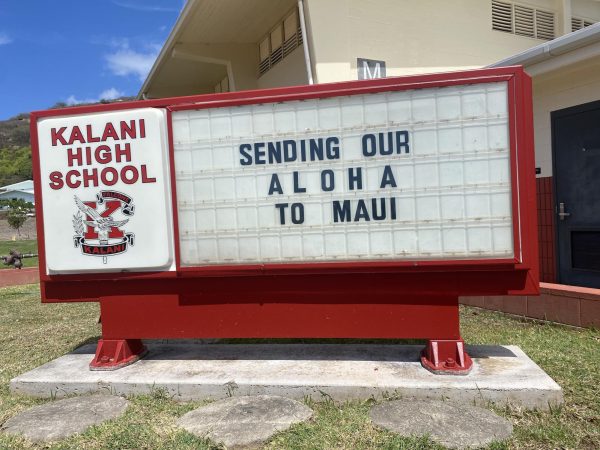
(Photo by Daniel Zheng, caption by Lily Washburn)
Almario emphasized. “Things like this, it’ll take a while for the community to rebuild, and we wanna be there for that, not just the immediate assistance.”
There are many ways individuals can continue to support Maui. Start by donating to Hawaii Community Foundation’s Maui Strong fund, Maui United Way, or Hawaii Foodbank’s Maui Relief fund.
“We always try to communicate, you know, every donation does make a difference, even if it might feel small,” Schlag explained. “A $5 donation; that can provide food for 10 meals. It might seem like a small thing, but 10 meals to someone struggling with hunger, that’s a major difference.”
Aside from donating, continuing to spread awareness on social media about the Maui Fires and how to help is extremely important in maintaining community involvement.
While Maui’s heart has been shattered, the people of Hawaii can help piece it back together.
“No matter the circumstances I think our community is aloha,” Schlag said. “That’s the thing that always shines through, that’s the thing that resonates the strongest long thereafter. And I think that’s the thing that always helps us rise above”.




